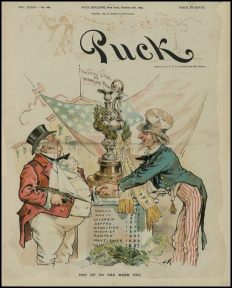 And how the two old men will enjoy the fun! They will be as happy as two schoolboys sailing their boats on Central Park Lake. If John Bull wins, why, Uncle Sam will congratulate and be anxious for the next contest, and if Uncle Sam wins, as every one hopes he will, why, John Bull will try to look just as pleased as if the cup were stowed in the hold of his boat. And how the two old men will enjoy the fun! They will be as happy as two schoolboys sailing their boats on Central Park Lake. If John Bull wins, why, Uncle Sam will congratulate and be anxious for the next contest, and if Uncle Sam wins, as every one hopes he will, why, John Bull will try to look just as pleased as if the cup were stowed in the hold of his boat.
The final preparations were made on the two yachts, the Valkyrie and Vigilant, yesterday, and last night both anchored off the Atlantic Yacht Clubhouse, waiting for today‘ s race. As soon as it was light enough to see to work, the crew of the Valkyrie and the gang of ship carpenters were at work smoothing off the boat's bottom. The crew soon got through their work, and then Capt. Cranfield gave them a few hours’ leave of absence to put them in a cheerful mood for to-day's big race. The carpenters hammered away at the copper plates on the yacht’s bottom, and by 11:30 o'clock Designer Watson announced that he was satisfied with everything and that the yacht could be floated.
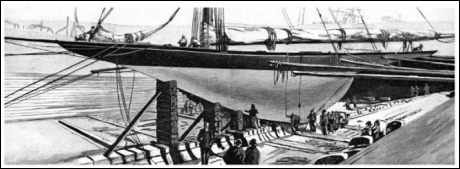
The men cleared out of the dock and the engine started to pump the water back. A big crowd of sightseers was in the yard, and every one admired the English boat.
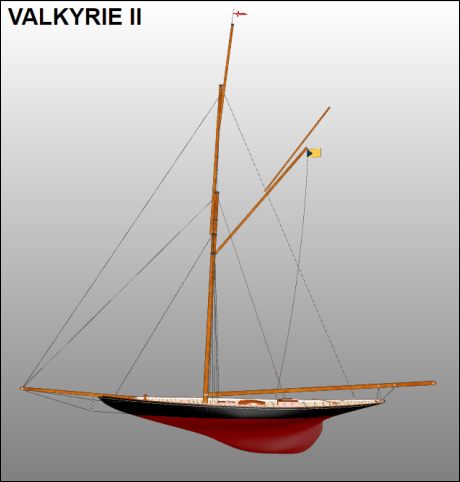
She was in perfect condition, and ready for the greatest race of her career. Slowly the water rose in the dock, and at 1:30 the English cutter floated. Just as she floated the tug Lewis Pulver, with Lord Dunraven, Mr. Charles Kerr, and Mr. H. Maifland Kersey, came up to the end of the dock and those gentlemen were at once transferred to the yacht.
To measure the English boat was the next work, and as quickly as possible all articles not used in a race were stripped out and put on floats and the yacht's boats. When this was done Mr. John Hyslop began his work. He first measured the boom and the gaff. Then he took his tape forward of the mast. As soon as this was done the length on the water line had to be obtained. For this purpose everyone was sent ashore except Lord Dunraven.
In England yachts are measured with the crew on board, and the same rule should be in force here, but an error in the wording of the rule gives yacht owners a, chance to send the men ashore, and the Englishmen were not slow to take advantage of it. 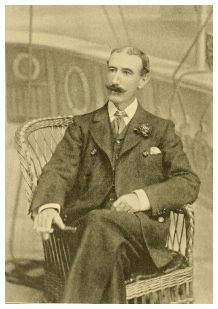 Lord Dunraven smiled as the men climbed over the sides of his boat, and when left alone amused himself with a cigarette and the carrier pigeon, the Valkyrie's mascot. His Lordship was evidently instructing the bird to root hard for the Valkyrie in the big race to-day. Lord Dunraven smiled as the men climbed over the sides of his boat, and when left alone amused himself with a cigarette and the carrier pigeon, the Valkyrie's mascot. His Lordship was evidently instructing the bird to root hard for the Valkyrie in the big race to-day.
As soon as the water line length was obtained, the crew put all the dunnage back again, and then started in to swash the decks. Mr. Hyslop then measured the mast for the perpendicular hoist. To do this a man was sent to the masthead in a boatswain’s chair, and held one end of the tape while Mr. Hyslop held the other end. Mr. Watson assisted Mr. Hyslop in measuring the Valkyrie, and when the work was finished carefully studied the figures.
While the work of measuring the yacht was going on, ex-Commodore James D. Smith and Mr. Cass Canfield, two members of the Cup Committee, stood on the dock. As soon as the length on the water line was obtained they went on board and were greeted by Lord Dunraven very cordially.
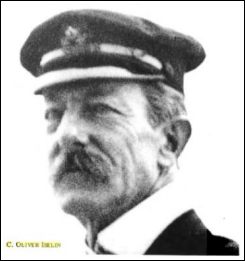 All this while everyone was anxiously looking for the Vigilant, which was to be measured in the same dock. About 3:30 o'clock word was received that the white cutter was coming and the crowd rushed to the end of the dock to get a glimpse of her. In a few minutes her tall mast, with Mr. C. Oliver Iselin’s red and black signal flying at the peak, was seen through the forest of masts in the docks, and at 3;45 o'clock the tug Commander, flying several of Mr. Iselin's Pennants towed the American boat into the dock. As she entered the basin the Royal Yacht Squadron burgee was run up to the masthead of the Valkyrie, and the British naval ensign was set on the staff over the taffrail. All this while everyone was anxiously looking for the Vigilant, which was to be measured in the same dock. About 3:30 o'clock word was received that the white cutter was coming and the crowd rushed to the end of the dock to get a glimpse of her. In a few minutes her tall mast, with Mr. C. Oliver Iselin’s red and black signal flying at the peak, was seen through the forest of masts in the docks, and at 3;45 o'clock the tug Commander, flying several of Mr. Iselin's Pennants towed the American boat into the dock. As she entered the basin the Royal Yacht Squadron burgee was run up to the masthead of the Valkyrie, and the British naval ensign was set on the staff over the taffrail.
The Vigilant swung slowly into the basin, and when she was made fast, Capt. Hansen collected his men forward and called for three cheers for the Valkyrie. They were given with a will, the sturdy crew of the American boat letting forth three big shouts and then a tiger.
The echoes of the cheers had not had a chance to die away before Capt. Cranfield had his men aft, and three times " Hip, hip , hurrah!" rang out from the lusty Britishers. Then the crowd on the docks took up the strain and gave three hearty cheers for both boats.
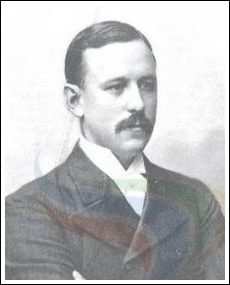 Mr. C. Oliver Iselin was on the Vigilant. He was accompanied by Mr. Ed Willard, Vice Commodore W. Butler Duncan, Jr., Mr. Herbert Leeds, Mr. N. G. Herreshoft, and Mr. Newberry D. Thorne. Mr. Iselin at once had the gig lowered and paid Lord Dunraven a visit, while Capt. Hansen set the crew to work to prepare for the measurer. Mr. C. Oliver Iselin was on the Vigilant. He was accompanied by Mr. Ed Willard, Vice Commodore W. Butler Duncan, Jr., Mr. Herbert Leeds, Mr. N. G. Herreshoft, and Mr. Newberry D. Thorne. Mr. Iselin at once had the gig lowered and paid Lord Dunraven a visit, while Capt. Hansen set the crew to work to prepare for the measurer.
The port anchor was dropped overboard, and about fifty fathoms of cable followed. This was all that had to be put off, as the yacht was stripped before she left New-Rochelle, and all her dunnage was on the Hattie Palmer.
After Mr. Iselin and the other visitors had left the Valkyrie, the yacht was backed out of the basin, and taken in tow by the Pulver for Bay Ridge.
Mr. HYSLOP then went on board the Vigilant, and Mr. Watson went with him as Lord Dunraven's representative to see how she was measured. When Mr. Watson went aboard he chatted with Nat Herreshoff for a while, and then the two designers went to work to assist Mr. HYSLOP. All the crew were sent ashore, and while the water line length was being taken not a man was on board.
The only other part to be measured was the boom, which is a new solid spar and a little shorter than the one used in the trial races. The work being done, the Commander towed the Vigilant to Bay Ridge, where she anchored for the night. |
|
The following is the result of Mr. HYSLOP’s work on the two yachts:
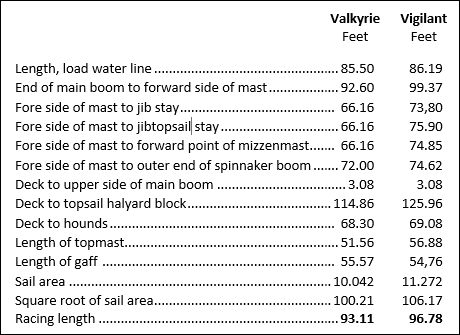
The racing length is obtained by adding the square root of the sail area to the load water line length. In this race all excess of 85 feet on the water line is counted double for calculating the racing length, so the Vigilant is rate as though she measured 87.38 feet and the Valkyrie as measuring 86 feet. These figures mean that the Vigilant will have to allow the Valkyrie 1 minute 48 seconds in each race. This is quite an item, and the Englishmen maintain that the American boat will not be able to do it.
Nearly two months ago The New-York Times stated that the Valkyrie measured 85.50 feet on the water line and not 86.72 feet as was reported in certain quarters. It will be seen that The Times was exactly right.
Each yacht spreads more than 10,000 feet of canvas. The Vigilant carries 1,130 feet more than the Valkyrie. Five years ago to put so much canvas on a yacht the size of either of these would have been regarded as a crazy freak.
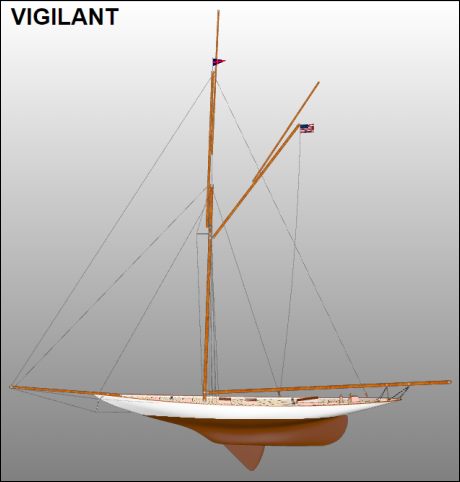
The challenging boat, the Valkyrie, is conceded to be the fastest yacht that has ever come over to this country to race for the America's Cup, and she is the fastest yacht that has raced in England this season, having won no less than eleven races out of twenty-three starts. She was built by the Henderson Brothers, from designs by G. L. Watson,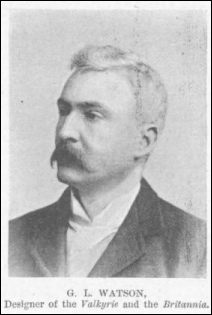 and since she has been in these waters she has attracted considerable attention, not only from the fact that she is the challenger for the cup, but because she has proved herself to be fast in all sorts of weather conditions. and since she has been in these waters she has attracted considerable attention, not only from the fact that she is the challenger for the cup, but because she has proved herself to be fast in all sorts of weather conditions.
An idea of the abnormal proportions of this boat may be realized by comparing her dimensions with those of the Galatea, the cutter Lieut. Henn brought over here to race for the cup in 1886. The Galatea was S7 feet on the water line and 102.6 feet over all. Her extreme beam was 15 feet and her draught 13.3 feet. Her main boom measured 93 feet in length, and the bowsprit outboard was 35.50 feet. Altogether she spread 7,751 square feet of canvas, so that it will be seen that on a smaller water line length the Valkyrie carries nearly 2.600 square feet of canvas more than the Galatea, and that she can carry it well and sail fast has been proved by the contests in which she has taken part on the other side.
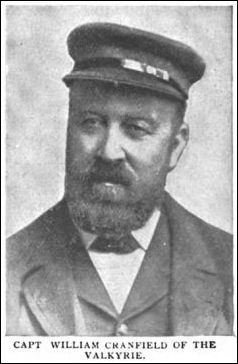 Capt. William Cranfield is the sailing master of the Valkyrie, and he has a crew of thirty-four men to sail the yacht. In addition to these men there will be on board during the race Pilot Martin Lyons, Designer George L. Watson, Sailmaker Thomas Ratsey, who will have two riggers with him; Capt. Harvey, who acted as her navigator when she sailed across the ocean; Lord Dunraven, and several of his friends who have crossed the ocean to see the contest, and Mr. Archibald Rogers, who will be the representative of the New-York Yacht Club. Capt. William Cranfield is the sailing master of the Valkyrie, and he has a crew of thirty-four men to sail the yacht. In addition to these men there will be on board during the race Pilot Martin Lyons, Designer George L. Watson, Sailmaker Thomas Ratsey, who will have two riggers with him; Capt. Harvey, who acted as her navigator when she sailed across the ocean; Lord Dunraven, and several of his friends who have crossed the ocean to see the contest, and Mr. Archibald Rogers, who will be the representative of the New-York Yacht Club.
The Vigilant, the yacht that has the task of defending the cup and keeping it in this country for at least another year, is one of the most wonderful boats ever built. When she was constructed last Spring some of the skeptical yachtsmen said that she would probably be a fast boat in light wind, but they did not see how she could carry her spars in anything like a blow. She has proved since then that in a light wind or in a heavy wind, in a smooth sea or with the waves tossing and tumbling about, she can sail faster than anything that has ever been built in this country before, and for that reason yachtsmen who have seen her sail feel no alarm at the ultimate results of the coming contests. They concede that the Valkyrie is a remarkably fast boat, and may prove very dangerous, but they think that the Vigilant is just a little faster in all kinds of weather.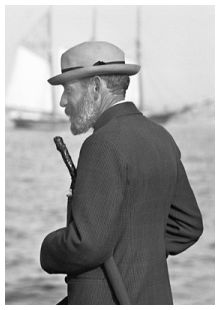
The Vigilant was built by the Herreshoff Manufacturmg Company, at Bristol, R. I., for a syndicate of New-York yachtsmen. Commodore E. D. Morgan and Mr. C. Oliver Iselin formed the syndicate, and their associates are Mr. O. H. P. Belmont, Mr. August Belmont, Mr. Perry Belmont, Mr. James M. Waterbury, Mr. Charles R. Flint, Mr. Cornelius Vanderbilt, Mr. Chester W. Chapin, Mr. Adrian Iselin, Dr. W. Barton Hopkins, and Mr. George C. Clark. The late H. Astor Cary was also a subscriber.
The Vigilant is a centre-board boat, built of Tobin bronze. The Valkyrie is a keel-boat, copper-bottomed. The value of the Tobin bronze is that it does not corrode or foul in the water like steel, and the bottom is burnished until it is as smooth as glass. Copper does not foul easily, but it is not nearly so good in the water as the bronze, so that here the Vigilant has another advantage over the Valkyrie. Then too, it has been proved over and over again that a centre-board boat can point much higher than a keel boat and this is where the Vigilant is expected to do her great work. In the trial races she show that she could outpoint any of the other cup defenders, and point higher, too than any boat that has ever been built. Keel boats usually have shown that they can reach faster than centre-boarders, but the centre-board boat in previous contests has gained so much on the windward that the keel boat has been unable to catch her when running free.
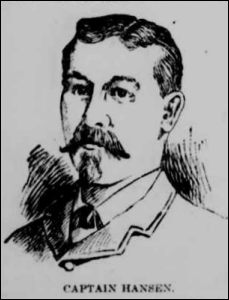 The Vigilant is commanded by Capt. William Hansen. Capt. Terry of the Greyling will also be on board to assist Capt. Hansen. The crew will number about forty men, and Mr. Iselin, who has charge of the boat for the syndicate, will probably have some of the members of the syndicate on board to assist him in handling the craft. Nat Herreshoff, the designer of the boat, will be there, and so will Rear Commodore W. Butler Duncan, Mr. Perry Belmont, Mr. Herbert Leeds, Mr. J. Rogers Maxwell, and other prominent amateurs. Lord Dunraven’s representative on the Vigilant will be his brother-in-law, Mr. Charles Kerr. The Vigilant is commanded by Capt. William Hansen. Capt. Terry of the Greyling will also be on board to assist Capt. Hansen. The crew will number about forty men, and Mr. Iselin, who has charge of the boat for the syndicate, will probably have some of the members of the syndicate on board to assist him in handling the craft. Nat Herreshoff, the designer of the boat, will be there, and so will Rear Commodore W. Butler Duncan, Mr. Perry Belmont, Mr. Herbert Leeds, Mr. J. Rogers Maxwell, and other prominent amateurs. Lord Dunraven’s representative on the Vigilant will be his brother-in-law, Mr. Charles Kerr.
|
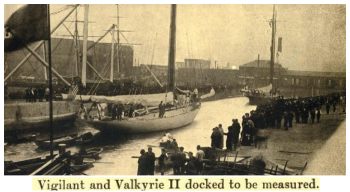 THE OFFICIAL MEASUREMENT
THE OFFICIAL MEASUREMENT Copyright © The New York Times - October 5, 1893 - John Bull and Uncle Sam will engage in a contest to-day. All differences between the two cousins will be put on one side, and the contest will be of the most friendly character.
Copyright © The New York Times - October 5, 1893 - John Bull and Uncle Sam will engage in a contest to-day. All differences between the two cousins will be put on one side, and the contest will be of the most friendly character.